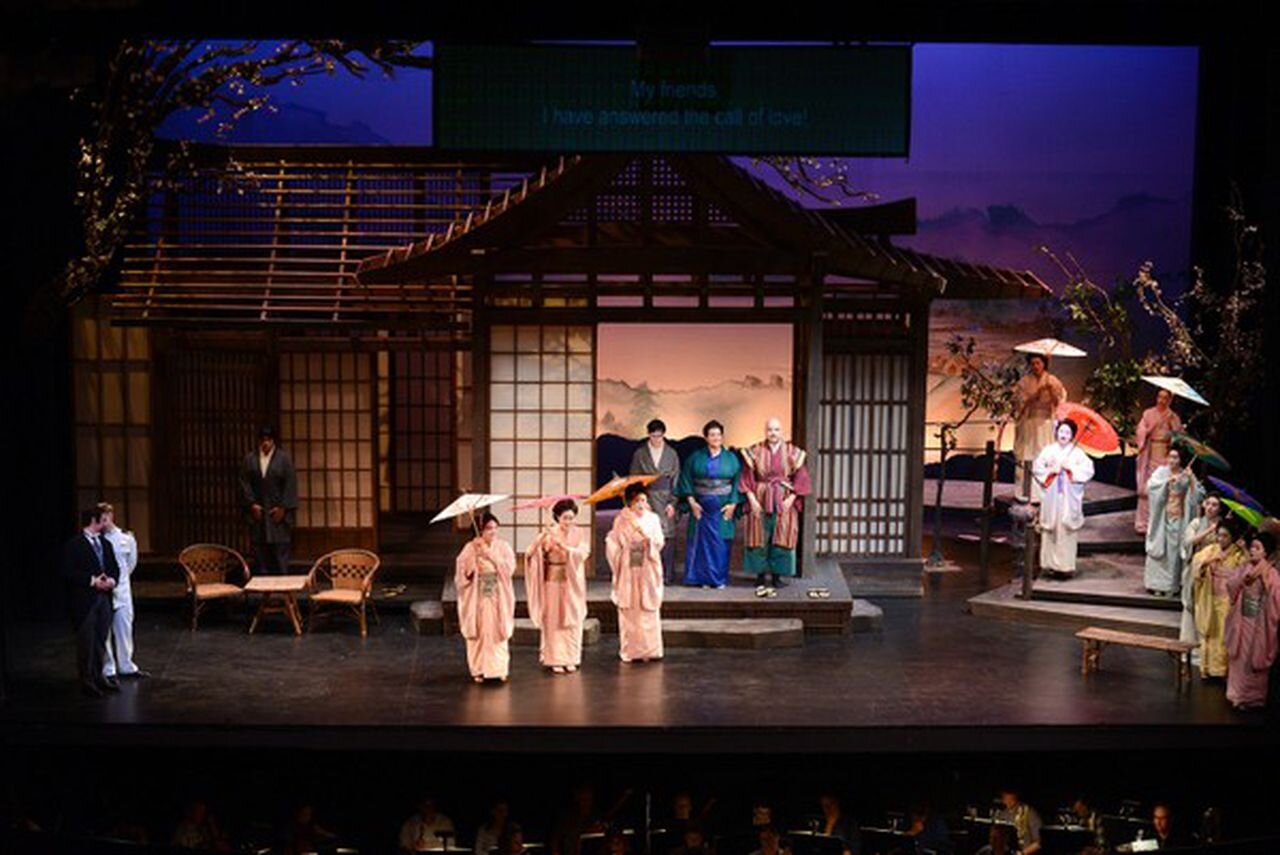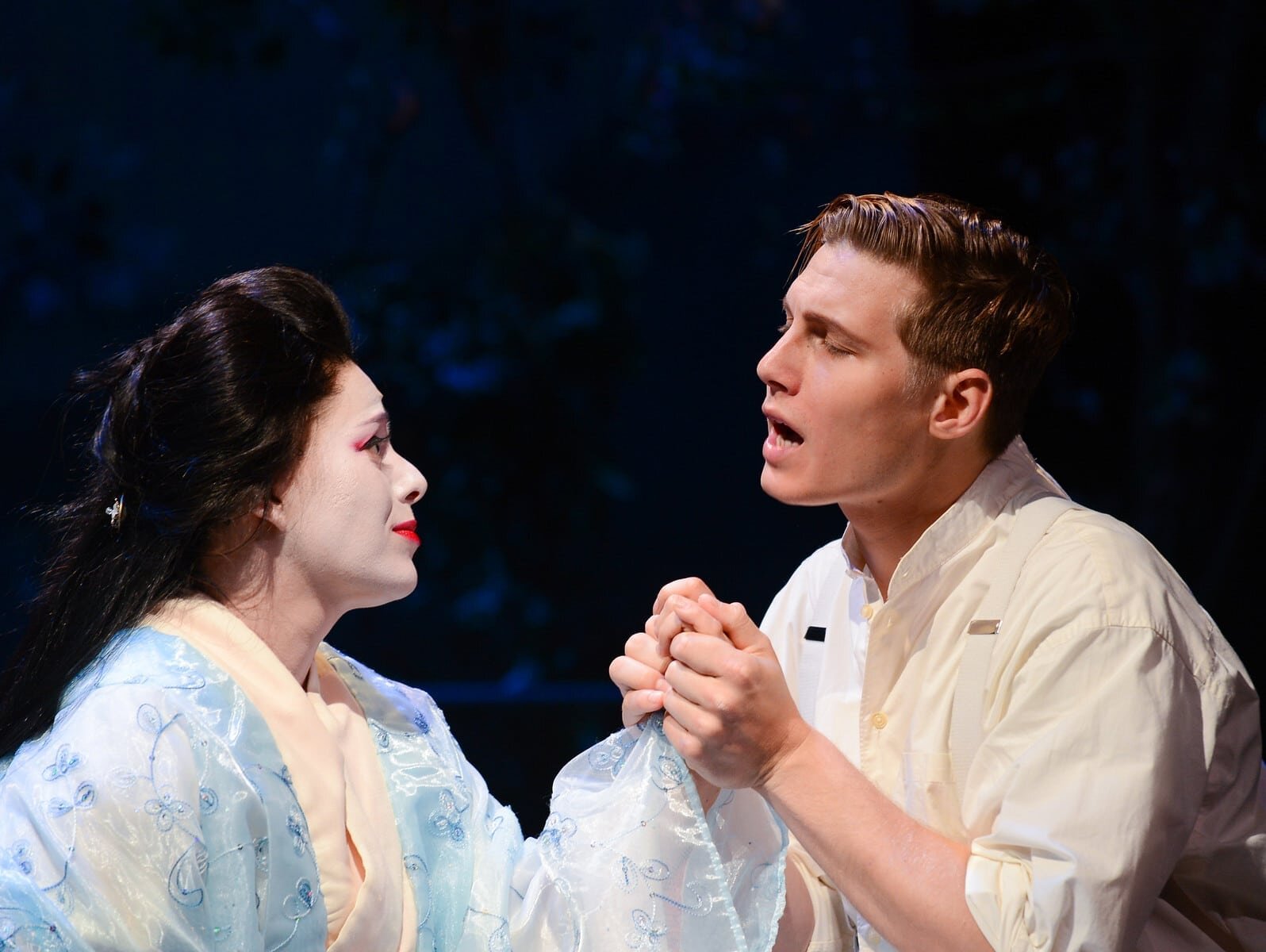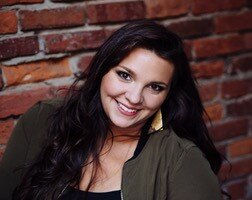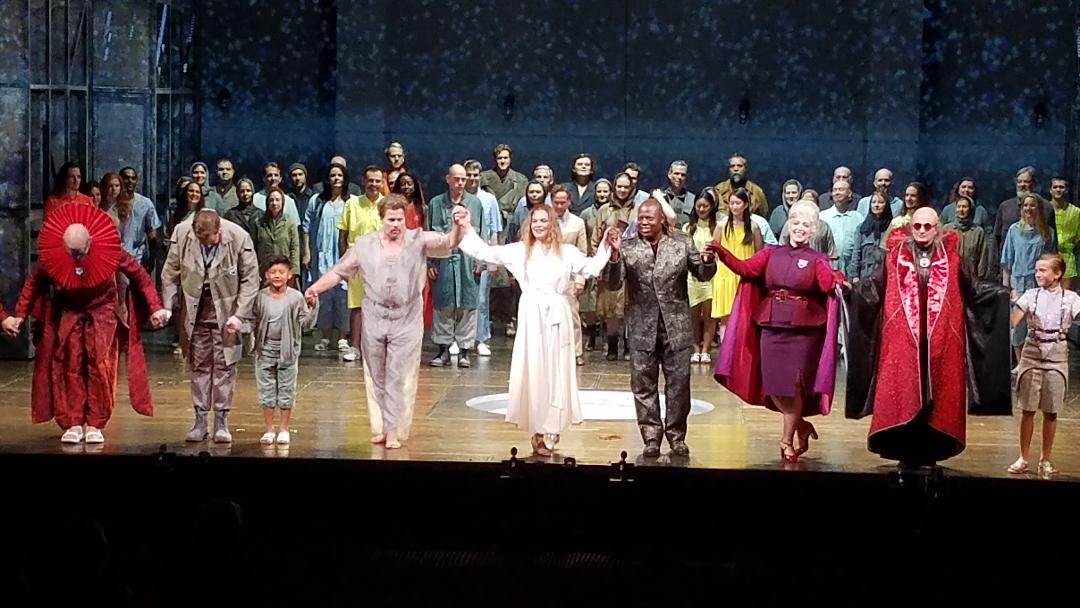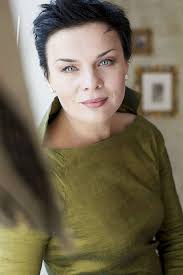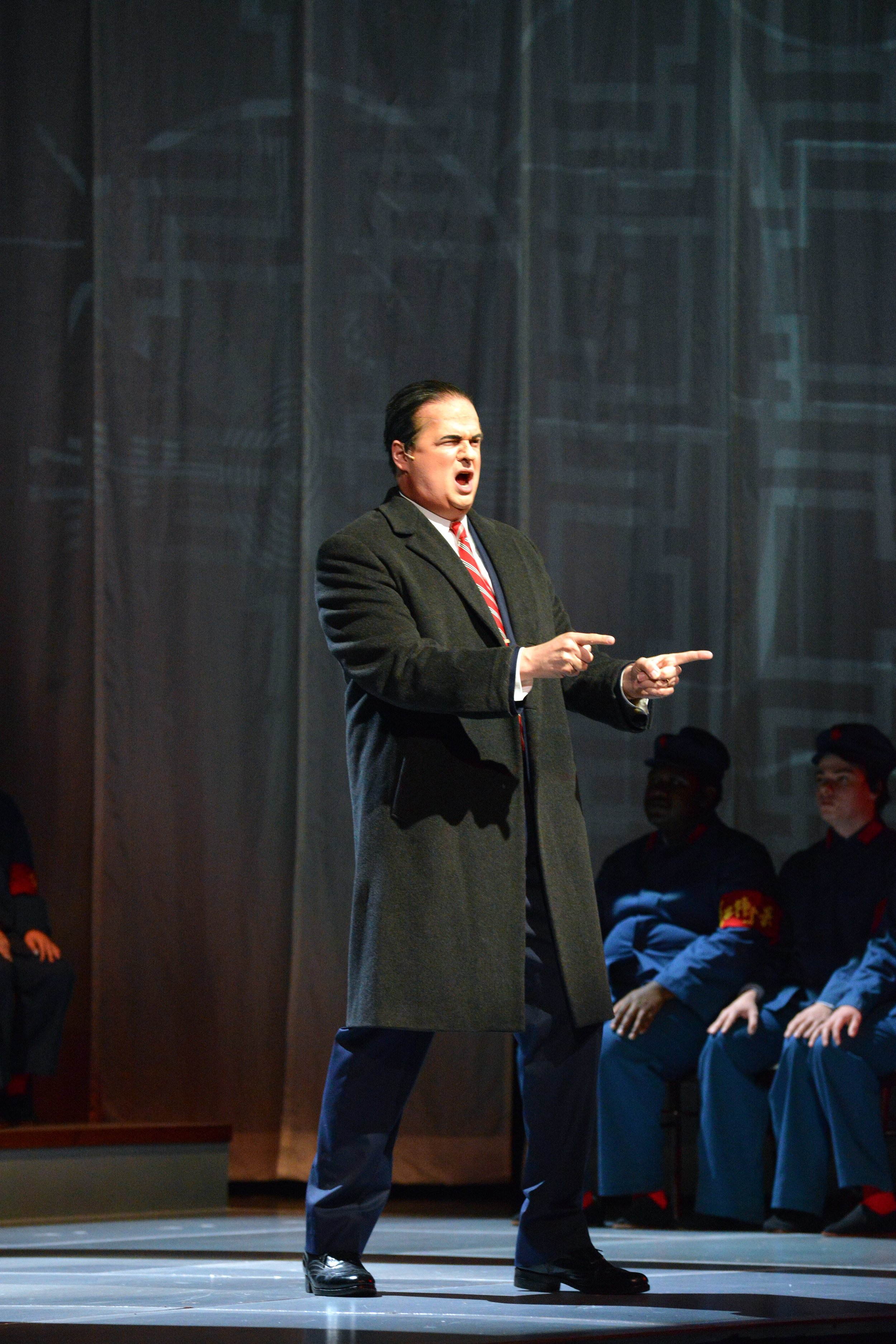CL: The truth is, the training NEVER ends for a classical singer. I count Will Crutchfield and the faculty here among the most influential mentors and coaches to my artistry both within and outside of the program’s parameters.
AT: Absolutely, Christine, I agree! The coaches, teachers, and directors are all very much on the same page, but yet they each bring something unique. Certainly they have their own strengths, which they share with us generously. I took one of the scenes I’m performing in to five different coaches/teachers and I got something different out of EVERY coaching. All insights. Very important too, though: they never try to take away from you your identity as a singer. Each of us retains a unique voice. Bottom line: the community they’ve created here is fantastic. That's the best part of Teatro Nuovo.
OM: Teatro Nuovo used period instruments last season to marvelous effect. I reviewed the fabulous opening night Tancredi. As singers, tell me about this switch from a modern orchestra to a period orchestra. Does this practice in anyway change the vocal approach to performing your role?
CL: Well yes, of course, but, it’s not just the instruments that are different. At Teatro Nuovo the highly influential and historically correct institution of a Maestro al cembalo and Primo violin e capo d’orchestra has been reinstated.
OM: Will Crutchfield at the cembalo and Jakob Lehmann as Concert Master and First violin. Same as last season.
CL: Exactly! It’s similar, we’re told, to the way orchestras were set up back in the day. The result is fascinating, its impact far reaching: the absence of a single stand-up conductor means that we, the singers, are given the opportunity, no, we’re actually encouraged to take more authority over our shaping of our vocal line. This set-up invites everyone on the stage and in the pit to think collectively, constantly and carefully listen to one another from moment to moment to craft the performance. Each moment is made up of its own, unique kaleidoscope of choices that we, as a group, feel inspired to make that day. I think we’re all finding that creating music in this manner paves the way for more spontaneity within every performance. I think it’s brilliant!
OM: Actually, Will Crutchfield emphasized the new freedom gained from the reorganization of the cembalo and primo violin in this season’s interview with him.
AT: But there is another difference as well: yes, using the period instruments allows us to give a much more authentic performance, but it’s not only the instruments: I mean, in the Baroque era, everyone used ‘period instruments.’
OM: Of course they did. Just like everyone in Mozart’s time composed ‘classical music.’
AT: Ha, ha! Right! But, point is, the pitch is different too: the Baroque orchestras tuned to A415. In the early Romantic era, the time of Bellini, it was common practice to tune to A430.
OM: So more to your point, it’s the tuning, not just that the instruments themselves are ‘period.’ Okay, how does that difference impact you?
AT: Singing at A430, as opposed to today’s tuning of A440, not going to lie here, was a bit jarring the first few days, but we got used to it.
CL: We did. Wasn’t really too difficult.
AT: Don't get me wrong, I love singing high notes! But I'm not going to complain about having to sing the ‘same’ high notes just a little bit under what I am used to. For sure, it takes a moment or two to adjust to, but I feel it's much nicer to perform this music as it was meant to be performed (and experienced) with the instruments that were playing then and the pitch they were tuned to!
OM: So modern recordings of La straniera are not much help in preparation, right?
AT: No. Correct! For practicing, I try to listen only to my recordings of my lessons and coachings. Unfortunately I can’t easily approximate the correct lowered pitch, even with a piano tuned to today’s standard.
OM: Changing the subject, these are semi-staged performances, same as last season. Did, last year, the absence of sets and props, maybe even no character specific costumes pose any additional challenges to your performance? Christine.
CL: The idea of executing complicated plot lines on the stage without sets and props was, I’ll admit, at first daunting, but after my experience last year with Tancredi rifatto I now understand that working with materials extraneous to the music can be a deterrent to the realization of the core material at hand. Unable to rely on lighting, costumes, props and makeup to communicate with our audiences, we’re tasked to take the listener through the dramatic/emotional experiences of our characters using vocal technique and spirit alone.
OM: You’re singing Alaide, the strange woman in La straniera. What is your acquaintance with La straniera in performance or on recording? And also with Bellini’s style in general?
CL: Alaide is a role debut for me, and it’s quite exciting because La straniera has not been heard in New York in over 20 years! Consequently, Will Crutchfield and I are really shaping the role vocally without feeling any pressure to do what has already been done by any other singer. I find myself pursuing daily what I think resonates best dramatically in the cues I take from Bellini’s score and Romani’s libretto. I think we are creating something totally alive and original. Add to this the bonus of reviving some of the most intensely beautiful music I’ve ever heard. It is one of the greatest artistic pursuits of my career.
OM: Totally agree: it’s a unique opera. Have you sung any other roles by Bellini?
CL: Yes, this marks the third Bellini role I’ve sung in the last year and a half. It’s been wonderful: I’m fairly certain I will never tire of singing his music! For me there is no other composer with whom I have felt such a timeless kinship. Bellini’s score, melded with Romani’s haunting libretto, has created an intangible element, one that has become interwoven into my own pathos. Singing Norma really solidified this bond for me. What a tremendous composition it is! The way he writes for the voice is completely unparalleled in terms of the freedom and autonomy he allows you in the expression of his melodies, and then the brilliant bursts of emotional fioritura are as exciting to tackle, as, I imagine it is, for example, for my dad to complete each portion of the triathlons he undertakes. Bellini is a language I want to speak daily. I’m operating in a creative wonderland here at Teatro Nuovo.
OM: The role of Alaide has a wide range of emotional moments.
CL: Oh my yes! For me, in the case of La straniera, these experiences include conjuring up an atmosphere of absolute solitude and abject sadness, delivering a bloody mad scene, sparring with thunder and lightning, and driving the evening home with a gut-wrenching cry of defiance to the heavens over the dead body of a man who has killed himself out of love for me. It’s a challenge I readily accept, knowing that the exercise can only elevate my vocal artistry, which is THE goal!
OM: Special preparation?
CL: I need only to listen to Maria Callas in her studio recordings to know that if you have the tools in your kit, the choices you can make as a vocal actor can be enough to serve up this gorgeous music and intense drama on a silver platter. Absolutely!
OM: Returning to the lack of costumes and props…Alina?
AT: Often, performers will say that "once I'm in costume on the stage, I really feel like I am in character." But in the chorus of Medea in Corinto last year, I didn’t at all feel out of place doing a concert version of an opera. We were very Greek Chorus-esque. So this year, as a resident artist performing a solo role, I expect, you know, that I’ll feel a bit vulnerable at first. But we're so well prepared here. I have to assume that feeling really prepared is a good start, one that will be work well throughout the season! Also I feel that an opera in concert provides exciting challenges: since we don't have costumes and aren't using props, at least not in Straniera, we have to focus on the music we’re making together. I very truly believe that our well-rehearsed musical numbers will be more than enough to engage an audience!
OM: You’re singing Isoletta, a young bride in La straniera. What is your acquaintance with La straniera in performance or on recording? With Bellini’s operatic style in general?
AT: Oh my! I have NOT performed this role before! In all honesty, though now it’s all ‘past tense’, I knew very little about Straniera, except that it was written by Bellini. Yes, I have performed other operatic roles and songs by bel canto composers, but this is the first time I have actually sung anything by Bellini. I mean, given recordings, it's hard not to know Norma and La sonnambula, since they're so iconic. But La straneira? It was a whole new experience for me.
OM: Looking forward, Christine, what roles do you seek to perform within the next, say, five years? And, for guidance, to whom does one turn for advice on such decisions? Will these roles involve voice training different from that which you’ve received lately? Do you have to re-tool, in other words, for these sought-after roles? Are there dream roles you seek to perform, but…by virtue of your youth and their challenges, you should put off for a longer spell?
CL: I am beginning to see my core repertoire emerge within the operas of Bellini, Donizetti, Rossini, Verdi and Puccini. Every bit of the bel canto techniques that have become the fabric of my vocal point of view will support me in interpreting this music in the richest way.
OM: Alina?
AT: I'm going to start off by saying that my dream role is, without question, Carmen. Ahhh…
OM: Yes, but?
AT: Well, ha! I think it is safe to say that it’s a role I will probably never perform, being, after all a lyric coloratura soprano and whatnot. As a young singer who is very new to this business, I feel in between a lot of things right now. There are so many roles that I could perform, but so much of it depends on the other voices that are cast, especially in Mozart and bel canto operas where there are numerous soprano roles. I would like to think that Violetta in La Traviata is a role that is coming in the future, but maybe at the end of the next five years? I have always dreamed to sing Zerbinetta in Strauss's Ariadne auf Naxos or all three of the soprano roles in Offenbach's Les contes d'Hoffmann.
But there are other factors: it is so important to have literally, I mean this, a tribe of people whom you can trust as a singer. You want to have a manger/agent, a teacher, a closer mentor, a trusted colleague, and a network of coaches who specialize in a number of different areas. In general, I try to only work with mentors whose opinions I can trust.
OM: And who love you.
AT: That too. My teacher, Brenda Harris, has nothing but my absolute best interest in mind. I trust her so much. I also trust Will Crutchfield's opinion a lot, I mean a lot a lot! His musical suggestions always come from a place of cosmic expansive knowledge. Honestly, I trust the opinions of all the coaches at Teatro Nuovo. A lot of them have given me the same suggestions seemingly without conferring with each other. Like I said earlier, they have a vocal sound in mind and they know how to develop it!
The role of Isoletta in La straniera has literally helped me re-tool my voice! Brenda and Will have worked with me to create a much stronger chest voice. Even though we may get all of our praise for high notes, it's so necessary for sopranos to get the chest voice right. My top register has done nothing but grow stronger with this improvement. I know I keep saying I got lucky, but really, I am so glad I have only worked with people who have improved my technique. It's so much more fun to work on details of improvement, as opposed to un-doing something wrong!
OM: Special things indeed! Okay, my friends, I have one more question for you and a request… What sorts of things do you enjoy talking about with normal people, myself of course not included in that group?
CL: I’m a full-time creative and am always preparing for my current role and the next. Many of us singers are carrying around 3 or more scores on a daily basis, and the joy truly is in the preparation. All in all, I feel like my job is my hobby!
OM: Alina. You’re up!
AT: I LOVE sports! My dad grew up in Boston, I have an enormous family still living there, so I've been a Red Sox, Patriots, Celtics, and Bruins fan my whole life. I know that the Patriots are polarizing, but I grew up with them, so what can I do? I had lived in Michigan until I was 23. I went to Michigan State University, my dad was a professor there, so I also followed MSU sports throughout my life. Here’s a Fun Fact: until I moved away for my master's program, I had only missed seven, count ‘em: seven home MSU football games since I was born! I still have the ticket from the very first football game when I was three months old!
Really, my dad loved sports. He instilled that love in me as well. Though I was never any good at any of them, I did play basketball, volleyball, and softball for a very long time. I can't name all the players on all the teams, but I love watching sports and playing in my fantasy football league. Our league is four years deep and I've won twice, beating ten guys. It might be my best non-musical accomplishment. I don’t know, I probably should get more hobbies: I love going star gazing, cooking, and board games, though I get a bit too competitive with the board games!
OM: OK, lastly, if you have an answer to a question I haven’t asked, say the question and then answer it.
AT: Cool! The question is: Alina, what is your favorite role in an opera or song you have performed? Without hesitation she answered: My favorite role I ever performed was Adele in Johann Strauss II's Die Fledermaus. She was such a fun character to play, and really, the life of the party!
OM: As are you. You’re smiling big time….But I want to return to a point you made earlier, Christine, about how the absence of a single conductor on a podium changes the relationship of the orchestra and the singers and the opera as written...
CL and AT: (standing in unison, as if premeditated) Please hold that thought, Metro! Answers, yes, but might we resume this at a later date?***
OM: Er, sure…keep in touch. No, no, I got the check….
Photos: Christine Lyons by Matt Medelsohn, Alina Tamborini by Tyler James with Tyler James Photography.
* Bellini’s La straniera is performed at 7:30 p.m. on Saturday evening, July 13, at the Performing Arts Center at Purchase College, Purchase, New York, and at 7:30 p.m. at Jazz at Lincoln Center Wednesday evening, July 17. Tickets for these events may be purchased at www.teatronuovo.org.
** Actually we did this by email, as usual, but I would have picked up the tab, were there indeed one. Happy we took rain checks on the face-to-face.
*** This afterthought question is answered on the Page labeled Addenda.
No, I, still chained to my desk at the OperaMetro office, have been given these wonderfully insightful, intricate and complete answers by emails from Alina and Christine. I’m happy not to have to reconstruct it from my ‘speed’ typing transcription…such as it is.
Note that even this interview is split into two pieces. After we finished, another question popped up and I have just received answers from Christine and Alina. Better, I think, to post the above now and then add, as a second interview, my singers’ rather detailed answers to the new question…I love talking to young artists. Like, really.
Happy summer 2019! Damn hot outside, so I’m told. About time!
OM.

